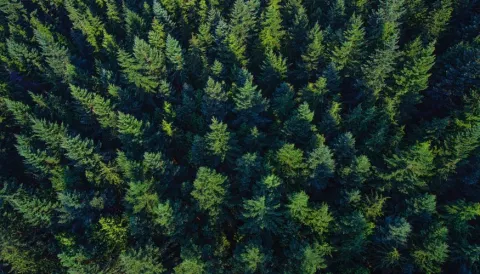UBC-based renewable natural gas project receives $2.38M in federal support

BC’s pulp and paper mills still use fossil fuels like oil and gas, producing greenhouse gas emissions that contribute to global warming. Thanks to $2.38 million in federal funding from Western Economic Diversification Canada, researchers at UBC can accelerate the development of new technologies that produce cleaner sources of energy for these mills, such as renewable natural gas (RNG).
By enabling forest residues — the small trees, branches and other woody “waste” materials that remain after a harvest — to be transformed into mill-ready synthetic gas (syngas) or RNG, these technologies are expected to not only reduce British Columbia’s carbon footprint, but also stimulate further growth in the province’s forestry sector, which exported $13.7 billion in products (34 per cent of all provincial exports) in 2016.
The UBC project will be spearheaded by the UBC BioProducts Institute together with the BC Pulp & Paper Bio-Alliance (the Bio-Alliance), a formal partnership between UBC, FPInnovations, the BC government and all pulp and paper companies in BC. The funding was announced today by the Honourable Joyce Murray, President of the Treasury Board and Minister of Digital Government.
“We are grateful for this governmental support, which will help UBC build on its significant existing investments in bio-based research and further solidify its position as a leader and innovator across a range of bioeconomy-related fields,” says project lead Tony Bi, a UBC chemical and biological engineering professor, an associate director of UBC’s Clean Energy Research Centre and director of the China-Canada Bioenergy Centre.
In addition to creating and commercializing cost-effective new clean technologies, which are expected to add up to 240 jobs at provincial mills, the project aims to provide technical guidance in the development of a commercial-scale demonstration plant. The plant will allow the viability of different technologies to be tested and ultimately enable pulp and paper mills to scale-up in their own operations.
The Bio-Alliance, which was established after the development of the BC government’s 2016 “Competitiveness Agenda for British Columbia’s Forest Sector”, invests in research and innovation activities to deliver technologies that advance the provincial bioeconomy — the part of the economy that creates valuable products (energy, chemicals and novel materials, among other things) from renewable biological resources such as forest and agricultural residues.
“The BC Pulp & Paper Bio-Alliance would like to acknowledge Minister Murray’s announcement of the WD funding award for RNG development at UBC,” said Bob Lindstrom of the Bio-Alliance. “We are pleased to partner with UBC and FPInnovations to focus on the development challenges of sustainable RNG production from woody biomass at an industrial scale. Success means transforming biomass into syngas or RNG to eliminate fossil fuel use in our production processes in BC.”
According to the Bio-Alliance, pulp and paper mills could effectively eliminate their use of fossil fuels if key equipment, such as lime kilns and power boilers, were powered by syngas or RNG. By overcoming technical and cost challenges to make forest byproduct-derived syngas or RNG an affordable alternative for mills, UBC and its partners may soon make this a reality — and significantly improve the health of our environment and economy in the process.
UBC was recently named number one in the world for taking urgent action to combat climate change and number one in Canada for making cities inclusive, safe, resilient and sustainable in the Times Higher Education (THE) University Impact Rankings 2019, the first global ranking to measure institutions' social and economic impact.